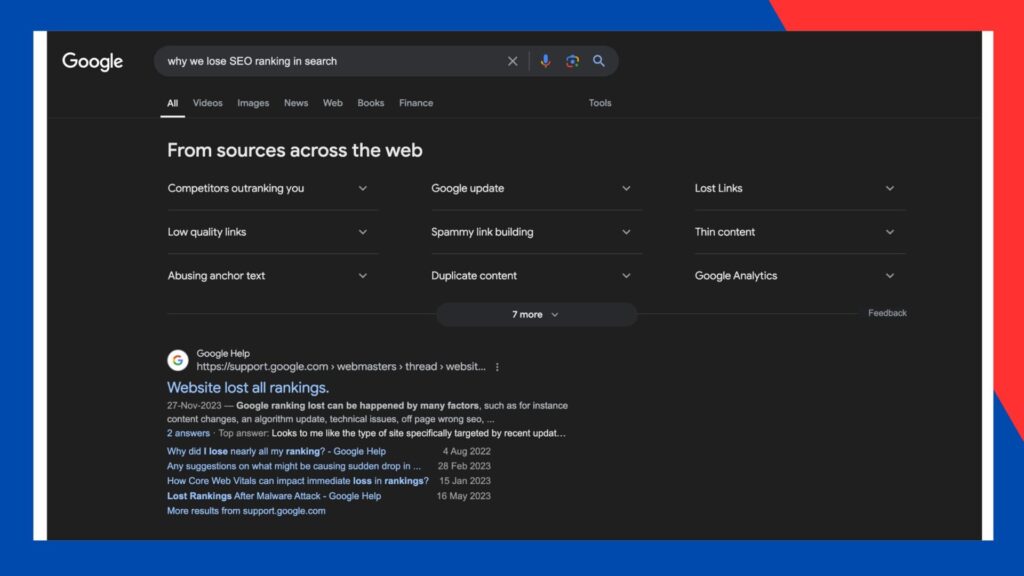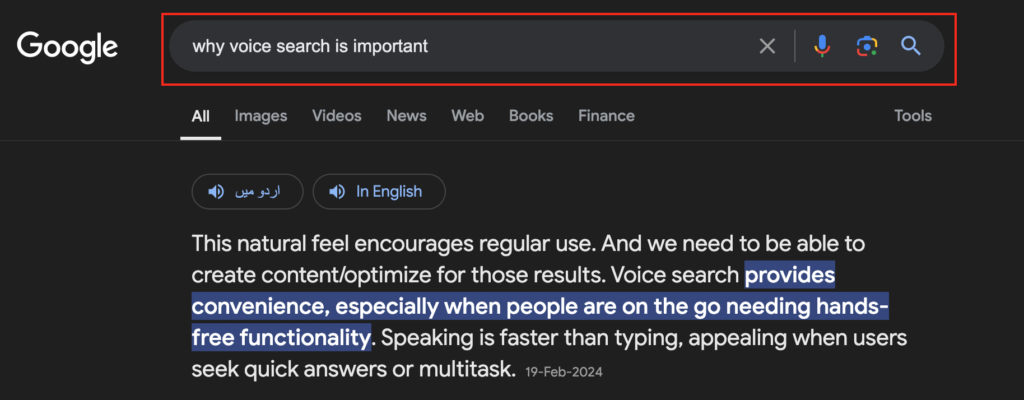
SEO for voice search is rapidly transforming the digital marketing era, emerging as a powerful tool for online discovery. With the increasing adoption of smart devices like Google Assistant, Alexa, and Siri, users are turning to voice commands for quick and hands-free access to information. This shift redefines how businesses connect with their audiences, emphasizing the importance of voice search optimization in maintaining competitive SEO performance.
According to research, nearly 50% of all searches are now voice-based, and this trend shows no signs of slowing down. Voice queries are typically conversational and focused on local searches, making them vital to customer engagement and conversion strategies.
Here, we’ll explore voice search’s growing significance in the digital age. We will discuss its impact on SEO, why it matters for businesses and practical steps to optimize your website to rank effectively for voice queries.
Quick View
What Is Voice Search for SEO?
Voice search is the process where users speak queries into devices, and these devices return results based on the user’s question.
As traditional search engine, voice search results often focus on delivering concise, spoken answers. As a result, optimizing for voice search is different from standard SEO tactics.
Why Voice Search Matters
Voice search is becoming increasingly popular. According to Google, 47% of the global population is now using voice search on mobile devices.
According to Google experts by 2025, half of all searches will be voice-based. This growing trend makes it important to implement voice search optimization strategies now to stay ahead of competitors.
1. Conversational Queries
Voice searches are more conversational, with users asking full questions like, “What are the best Italian restaurants near me?”
- Strategy: Optimize for long-tail keywords and natural language phrases.
- Fact: 70% of searches on voice assistants are phrased as questions.
2. Local Search Dominance
Voice search plays a significant role in local SEO. Nearly 58% of users search for local businesses via voice weekly.
- Strategy: Optimize Google My Business profiles with accurate NAP (Name, Address, Phone).
- Fact: “Near me” searches increased by 500% in the last two years.
3. Featured Snippets
Voice assistants often pull answers from featured snippets.
- Strategy: Create concise, informative content that directly answers common questions.
- Fact: Over 40% of voice search results come from featured snippets.
How to Do SEO for Voice Search

Optimizing your site for voice search requires a few unique strategies. Here are actionable steps for voice search SEO:
Focus on Conversational Keywords
Voice search queries are usually longer and more conversational than text-based queries. For example, instead of typing “best restaurants,” a user might ask, “What are the best restaurants near me?” To optimize for voice search, focus on long-tail, conversational keywords that match how people naturally speak.
Example:
- Traditional Keyword: “best pizza”
- Voice Search Keyword: “Where can I find the best pizza near me?”
Optimize for Question-Based Queries

People often ask questions during voice searches. Aim to structure your content around common questions related to your niche. This includes using question words like “who,” “what,” “where,” “when,” “why,” and “how.”
Example:
If you’re running a fitness blog, try incorporating questions like:
- “How can I lose weight quickly?”
- “What are the best workouts for beginners?”
Prioritize Local SEO
Most voice search queries are local, such as “restaurants near me” or “best plumbers in [city].” Ensure your business is optimized for local SEO by:
- Claiming your Google My Business listing.
- Including your business name, address, and phone number (NAP) on your site.
- Encouraging positive reviews from satisfied customers.
- Submit your website in local business directories.
Other with deep imformation about local SEO optimization, also you can read this: Local Search Optimizations
Improve Your Site’s Load Speed

Voice search users expect quick responses. Google prioritizes fast-loading sites in voice search results. To optimize load speed:
- Compress images and files.
- Use a reliable hosting service.
- Enable browser caching.
Create Featured Snippets
Featured snippets are the top results on Google, often referred to as “position zero.” Voice search frequently pulls answers from featured snippets. To rank in this spot:
- Answer common questions concisely.
- Use bullet points, lists, or short paragraphs.
- Ensure your content directly addresses user intent.
Use Structured Data Markup
Structured data (also called schema markup) helps search engines understand your content better. By implementing schema, you can enhance your chances of appearing in voice search results.
Example of Structured Data:
<script type="application/ld+json">
{
"@context": "https://schema.org",
"@type": "FAQPage",
"mainEntity": [{
"@type": "Question",
"name": "What is voice search SEO?",
"acceptedAnswer": {
"@type": "Answer",
"text": "Voice search SEO is the process of optimizing your website to rank for spoken search queries."
}
}]
}
</script>
Voice Search Optimization Strategy
Now that you know the basics, let’s dive deeper into specific techniques you can use to master voice SEO.
Focus on Natural Language
Since voice search queries tend to mimic how people talk, your content should sound natural. Avoid using robotic or overly formal language. Instead, write in a conversational tone.
Target Long-Tail Keywords
Voice searches are often longer and more specific. By focusing on long-tail keywords, you increase your chances of matching voice search queries.
Example:
- General Keyword: “digital marketing”
- Long-Tail Keyword: “What is the best digital marketing strategy for small businesses?”
Optimize for Mobile Devices
Most voice searches are done on mobile devices. Ensure your website is mobile-friendly by:
- Using responsive design.
- Ensuring fast load times on mobile.
- Simplifying navigation.
Utilize FAQ Pages
FAQs are a great way to answer common questions your audience might ask via voice search. Create a dedicated FAQ page or add a FAQ section on relevant pages.
Example FAQ:
Question: “How does voice search work?” Answer: “Voice search works by converting spoken language into text, then finding relevant online content based on the query.”
Keep Content Short and Direct
Voice search tends to favor short, precise answers. Keep your sentences concise and to the point, especially when answering questions.
Example:
Instead of writing:
“Voice search SEO is the process of optimizing your website to appear in search results when users speak queries into devices like Google Home, Amazon Alexa, or Apple Siri.”
Try:
“Voice search SEO optimizes your site for spoken queries.”
Future of Voice Search (for 2025)
Voice search is revolutionizing how people interact with technology, and its impact on businesses is undeniable. According to Statista, 41% of adults in the U.S. use voice search daily, a trend expected to grow as smart devices become more integrated into daily life.
With advancements in AI-powered assistants like Alexa, Siri, and Google Assistant, optimizing for voice search is crucial for future-proofing your business.
Voice Search Marketing Trends
1. Integration with Wearables
Voice-enabled wearables like smartwatches are gaining popularity, allowing users to search hands-free.
2. Personalization
Voice assistants are becoming more personalized, offering tailored responses based on user preferences and history.
3. Enhanced Voice Recognition
Future voice assistants will recognize individual voices better, offering more accurate and secure interactions.
4. AI and Machine Learning
Advancements in AI make voice search more intuitive and accurate. For example, Google’s BERT algorithm improves the understanding of context in voice queries.
5. Voice Commerce
Voice commerce is expected to reach $40 billion by 2024, transforming how consumers shop online.
- Strategy: Optimize e-commerce platforms for voice-based commands.
- Example: Enable voice-enabled checkout features for faster transactions.
6. Internet of Things (IoT)
IoT devices like smart refrigerators and thermostats integrate voice search, offering new opportunities for product placement and advertising.
Voice Search Optimization Services
If managing voice SEO seems overwhelming, consider hiring a voice search optimization service. These professionals specialize in optimizing content specifically for voice search, ensuring your site remains competitive in this rapidly changing landscape.
Choosing the Right Service Provider
When selecting a voice search optimization service, look for providers who:
- Have experience with voice search algorithms.
- Understand local SEO strategies.
- Can provide real-world results and case studies.
Voice search is reshaping how people interact with search engines. To stay ahead, businesses must adjust their SEO strategies to include voice search optimization.
By focusing on natural language, local SEO, and speed, you can ensure your website ranks well for voice queries. The future of search is spoken, so it’s time to make your site heard.




